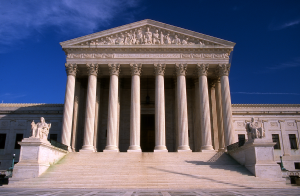The balance of power between politicians and lawyers in our country is frustratingly not as black and white as it first appears to be (not much within our political system is – as I have worked out whilst studying A-Level Politics). It is widely understood that the legislature makes our laws, and the judiciary interprets these laws… so where does the “power” ultimately lie? Our country operates under a common-law system, meaning that legislation is made by both the passing of legislation via Parliament and also the creation of precedents through case law. But it is not just the passing of legislation that feeds into “power”, it is the interpreting of legislation that creates a real grey area…
Comfortably perching at the summit of the UK Judiciary is the Supreme Court, which was only recently established in 2005, mainly over criticism that there was an incomplete separation of powers between Parliament and the former law lords. It’s the Supreme Court that sparks controversy in the UK, with its unrepresentative panel of Justices that make some of the most far-reaching decisions on interpreting law and legislation, making some monumental precedents. It would be undoubtedly erroneous to say that the Supreme Court has a growing power, but it wouldn’t be deemed erroneous to say that the Supreme Court has a growing authority. But don’t these two words share the same meaning? Well, power is the ability to do something, which the Supreme Court doesn’t have in terms of making legislation whilst authority is the right to take a particular course of action- interpreting legislation by making rulings in particular cases. Its growing authority is demonstrated through the acceptance of its rulings by the media, the public and Parliament itself. Let’s take a glance at one of its most recent rulings on what some deemed as “Parliamentary business”:
The UK Supreme Court apprehensively grasped its moment under the spotlight in September 2019, when Prime Minister Boris Johnson took the first step in his streak of controversial decisions in proroguing Parliament for five weeks, in order to try pass through a controversial Brexit bill. The proroguing of Parliament would suspend Parliament meaning they couldn’t sit, and end all current legislation under discussion, giving rebel Tory MPs and opposition less opportunity to pass through any anti no-deal legislation. The power of proroguing Parliament is a royal prerogative, and therefore Johnson had to advise (which he did badly) the Queen on using this power. Of course, all the MP’s locked out of the House of Commons had more than a lot to say about this decision, and they took legal action which ultimately led to the hesitant involvement of the Supreme Court, who braced themselves for criticism that they were overstepping their authority. The Supreme Court ruled that Johnson’s prorogation of Parliament was “unlawful”, and therefore made Johnson’s decision against the law, so it was voided. In other words, if the Supreme Court said “no” and Parliament and the Prime Minister said “okay then, we won’t”- it seems powerful?
However, one would only have to peek over the Atlantic to see that in reality, the power of the UK’s Supreme Court shouldn’t be keeping you up at night, as in the US the Supreme Court holds a significantly bulkier heap of power. The separation between the legislature, executive and judiciary just isn’t the same in the US, and ultimately makes politics over there a profoundly different playing field to that in the UK. In fact, Jon Sopel even says in his book “If Only They Didn’t Speak English” that “You see, if only they didn’t speak English in America, then we’d treat it as a foreign country- and probably understand it a lot better”, which really amplifies the difference in our political systems and institutions. In the US, the Supreme Court is organised by Congress, and most nominations are done by the President- seeming to point to the noteworthy “politicians in robes” metaphor. The US Supreme Court has an additional power of being able to ultimately strike down laws passed by Congress by declaring them “unconstitutional” (as they have a written constitution which we simply don’t have over here). Concerningly, we only need to go back a few months to witness the US Supreme Court overturn Roe v. Wade, meaning the Constitutional right to an abortion no longer exists. But how did this happen? The Supreme Court used its power to declare that a right to an abortion was not a right “deep-rooted in the nation’s history” and therefore didn’t have a place in the constitution. So although the Supreme Court didn’t make a law, they overturned a right which in essence changed the law, making the Supreme Court profoundly powerful.
Jetting back across the Atlantic to the UK, the judiciary/the Supreme Court simply don’t have the power to change the law so significantly, as they can only interpret already existing laws passed by Parliament, and build case law from this. Furthermore, the UK Supreme Court wouldn’t want to have this power they have in the US, as the Justices fret about over-stepping their reach due to the fact they haven’t been elected to represent the views of constituents on the same level that MP’s passing laws in Parliament have.
In essence, who holds the power is not much clearer. Parliament holds the ultimate power as through a simple Act of Parliament, they can revoke any law- including the Parliament Act 1998 which gives the judiciary the power it has. However, due to the support and significance the judiciary’s decisions have from the public and the media, and in particular those decisions of the Supreme Court, Parliament stands by the Supreme Court’s rulings, in fear of being criticised as “undemocratic”.

